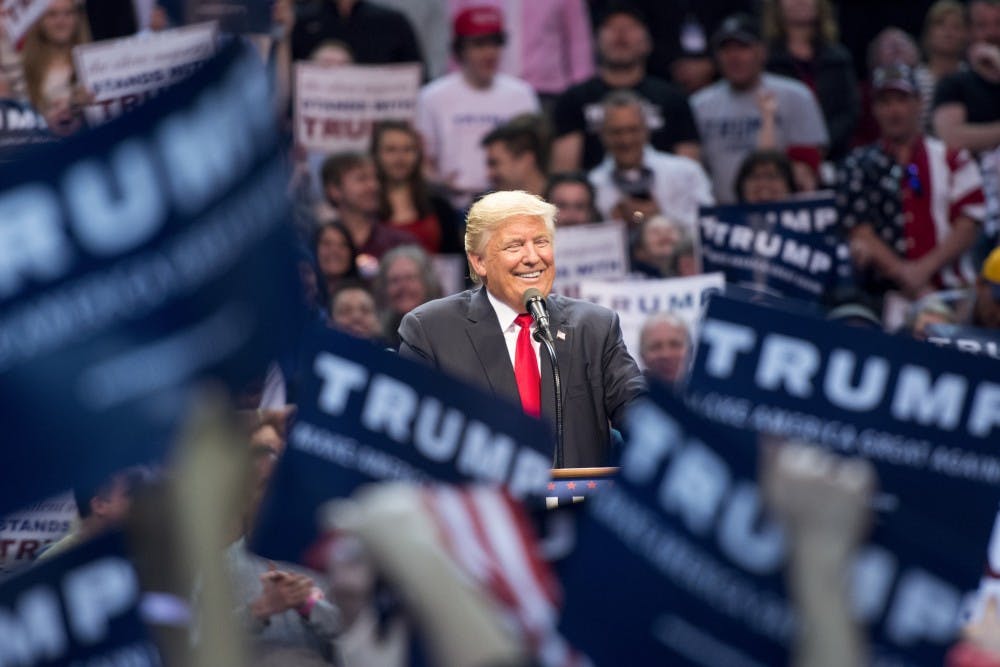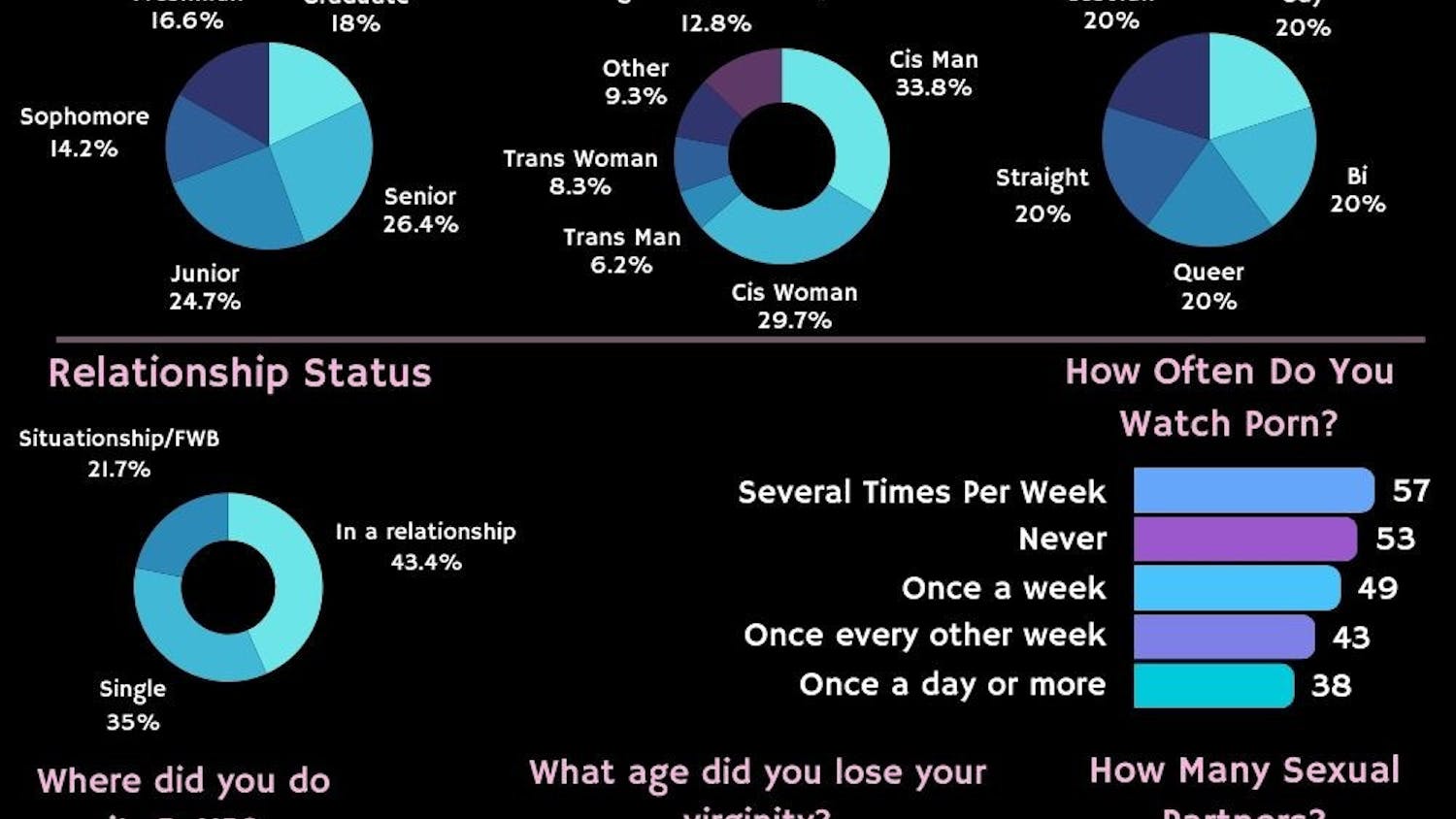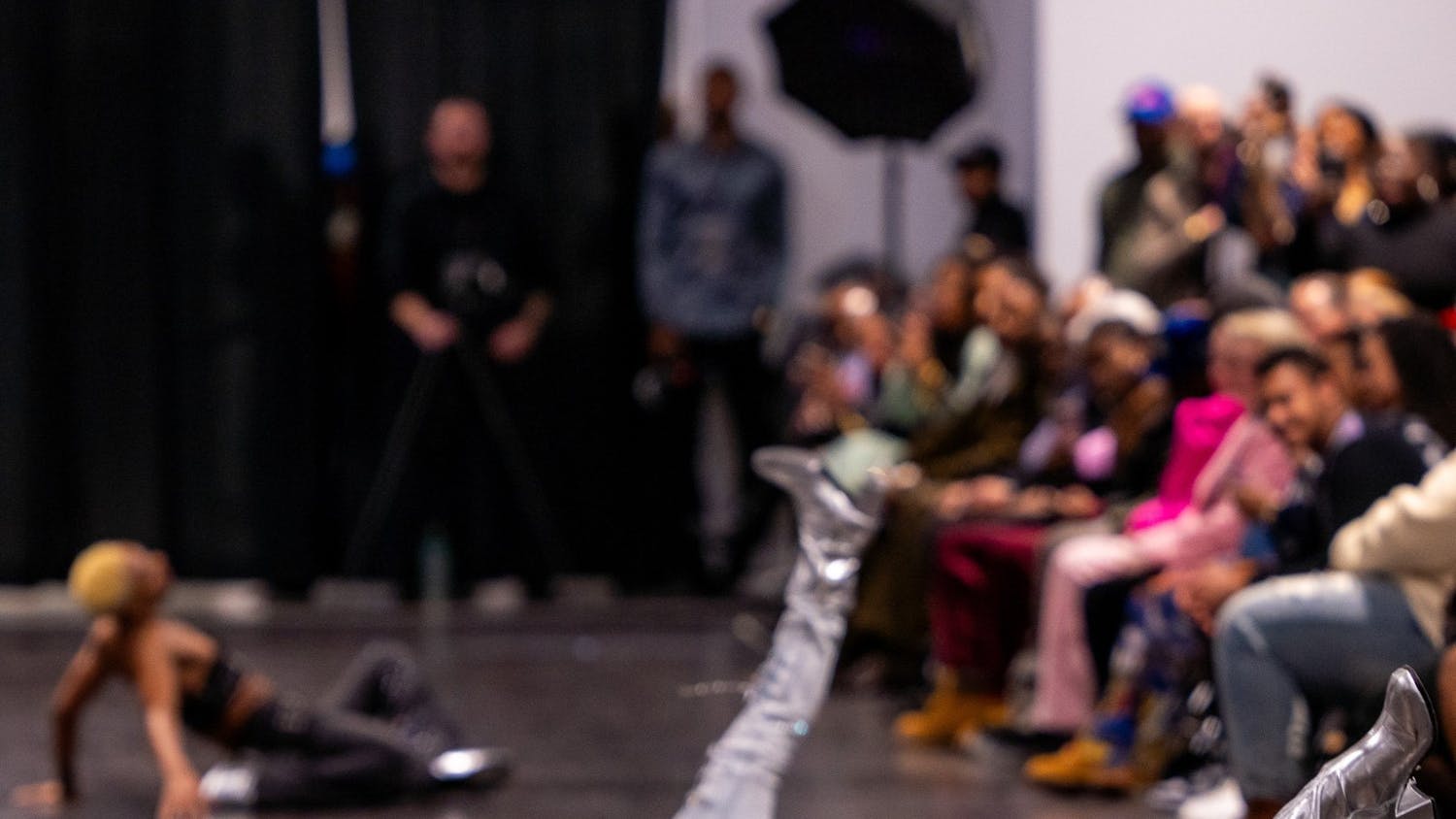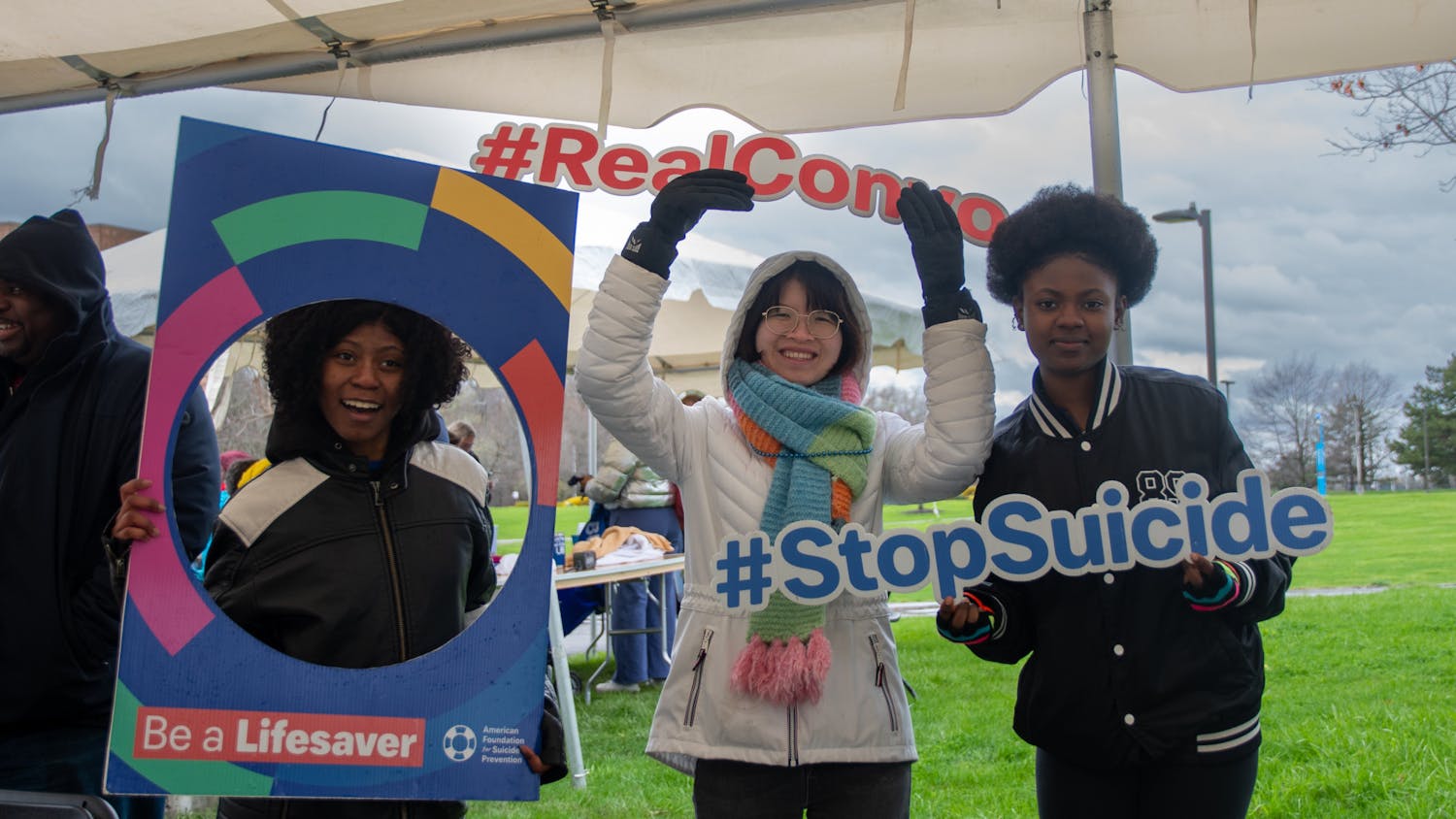Jacob Kathman said the 2016 presidential campaign is the most “disgusting” campaign he has ever seen.
Kathman, a political science professor, and millions of other Americans have greeted this election with both triumph and anguish, proving the political landscape is more divided than ever.
Republican presidential candidate Donald Trump defeated Democratic candidate Hillary Clinton and was announced the president-elect of the U.S. on Nov. 9. Eighteen months of campaigning and several hours of vote counting are finally over.
Trump won 279 of the 270 electoral votes needed, while Clinton earned only 228.
Often deemed as the anti-establishment candidate, Trump was able to secure the votes of those who were disgruntled with and weary of the status quo. But some Americans feel sickened, appalled and unsafe living in a country where Trump serves as the leader.
Students and faculty agree that the country is the first priority in the wake of the shocking outcome of the election. Anti-Trump protests continue to spill out across the country while Trump supporters continue to rejoice his victory.
As the highly contentious and unusual election comes to an end, many have posed the question: “Where does the country go from here?”
The upset
When Dillon Smith first learned that Trump had been elected, he was in a state of disbelief.
Smith, a senior political science and economics major and an avid Clinton supporter, felt a wave of sadness and began ruminating on what Trump’s presidency would mean for at least the next four years.
“I think it is never excusable to place political agendas over the moral fiber of the man or woman elected into office,” Smith said. “The office of president or any other public office is defined not just by the constitution, not just by the individual states – it’s defined by the people that hold it. It could be either honored and cherished or degraded and destroyed. To have your own political bias give you a blind spot to a very negative man is [not excusable.]”
Kathman was saddened and shocked that people could rationalize voting for Trump. These ideals are not political issues, they’re moral values, Kathman said.
“The polls that I had followed had all seemed to predict Clinton. And I will say to be perfectly frank that the overriding feeling I had was sadness,” Kathman said. “Donald Trump ran an extraordinarily negative campaign where he denigrated lots of people – women, immigrants, Muslims. I think he many times unknowingly denigrated African Americans. I was not expecting that he could win an election that I saw being based on bigotry and misogyny.”
Kathman doesn’t believe Trump gave a voice to people who felt left out of the political process. He thinks it’s unfortunate that Trump used Muslims and other immigrant groups as “scapegoats” as a means of mobilizing the people who felt left out of the political system.
The fear
Akash Rahman fears Donald Trump’s election is the beginning of the end for the U.S.
“Since Trump announced his candidacy, you see a huge movement in the far right, the fascists, the people in America that hold the racism, the bigotry, the xenophobia and you see a divide in the Democratic party,” Rahman, a junior health and human services major, said.
Phynis Davis is scared for LGBTQ individuals who are just coming out of the closet. The idea that Mike Pence, Trump’s vice president, believes in conversion therapy is disconcerting for Davis, a transgender freshman environmental studies major.
Smith worries the country will be non-inclusive under Trump’s administration.
“I’m fortunate for being a white straight male that I don’t have to face [the same fear], but I remember being with friends last night who were minorities who just knew people who would be adversely affected by Trump’s presidency. This might not be the America that we want but we can always try to change it,” Smith said.

The dangerous precedent
Kathman believes politics have taken a turn in the last few decades toward less civility, less cooperation and more polarization causing animosity and hostility across party lines.
“When your kids come home from school and they ask you, ‘Why don’t we like Muslims?’ That has an effect on me as a voter and someone that’s engaged,” Kathman said. “I don’t want that kind of poison to reach my kids. That type of cancer turns people off more than it mobilizes them.”
But the professor still believes in hope and love as the most important tenets in life.
“I hope that in future campaigns we can hear people’s policies which was in short supply this time around and I really, really don’t want millennials to turn away from the political process,” he said.
Kathman’s personal political leanings would never affect the way he teaches his students, he said. He said neither the university nor the political science department should be judged from his personal perspective.
Thirty-seven percent of millennials voted for Trump, according to a CNN Politics exit poll of 24,537 voters – a much higher turnout than most expected.
The voice of Trump supporters
For Jennie Gibson, the corruption in Washington D.C., could only be washed out by pushing corrupt politicians out of office.
“I supported [Trump] as a Republican candidate because for the most part, his policies reflected my political views and my political agenda,” Gibson, a sophomore communication major, said. “I have a lot of friends and family who are devastated by the elections and a part of me feels guilty for that. I don’t like to see people I care about in that much pain over the election.”
People are blaming Trump supporters for Clinton’s loss, but at the end of the day, Gibson said, Clinton failed the Democratic Party.
Many Trump supporters believe his policies and platform override his individual character.
Trump captured swing states like Pennsylvania and North Carolina and that may be indicative of the nation’s yearning for a new regime, Gibson said.
Her role as a female Trump supporter has proved very controversial. Just because she supports Trump doesn’t mean she’s misogynist or a racist, she said.
Gibson acknowledges Trump should have been more careful with his words. Both Gibson and Reed Tighe, a senior political science major and president of UB College Republicans, believe the media exaggerated Trump’s comments.
“Has Trump said things that he probably shouldn't have? Yes, but who hasn't? However, many of these things have been taken out of context or spun to fit a narrative, Tighe said. “Trump cares for all Americans, regardless of race, gender, sexual identity[or] religion.”
Tighe believes Trump wants to do what is best for everyone. He said Trump’s interest group is the American people and he wants to keep them safe so that everyone has an equal opportunity to life, liberty and the pursuit of happiness regardless of any demographic.
Gibson doesn’t believe Trump should be held accountable for the comments he made prior to running for presidency. She said the way Trump carried himself as an entrepreneur is different from the way he has carried himself as a president-elect. Although Gibson believes Trump’s controversial comments attest to his character, she does not think it speaks to his platforms.
“Now that he has been elected president, I think we will see that change and maybe he will take his role with more responsibility,” Gibson said.
Where Clinton went wrong
Clinton’s first misstep in the presidential election was being born a woman, according to Kathman.
“Donald Trump has bragged about the size of his penis multiple times in this election. Can you imagine a woman bragging about her vagina and it’s virtues and not facing backlash?” Kathman said. “If she ever mentioned the virtues of her vagina, her sexual conquests, if she had been married three times and had multiple affairs, if she had barged in on men changing their clothes at beauty pageants – going beyond issues of sex if she had ever said that John McCain wasn’t a war hero because he was captured? As a woman candidate you are immediately disqualified for any of those comments … as a man, you are not,” Kathman said.
Kathman admits Clinton is far from the perfect presidential candidate. He said Clinton could have been more forthright in the way in which she has dealt with her public controversies instead of keeping her supporters “tight” rather than being an open book.
The distribution of classified emails and the “pay-for-play” behavior within the Clinton Foundation that goes all the way back to her senator days made Clinton’s quest for presidency all the more elusive, Kathman said. He said Clinton’s unwillingness to respond to the controversy in an apologetic and empathetic tone may have cost her the presidency.
“She’s either a criminal mastermind in not ever being convicted of a crime or she’s a lightning rod, so the Democrats putting her forward put themselves in a position where they had to have Donald Trump and they still couldn’t win with Hillary Clinton,” he said.
Gibson thinks Clinton did not address the economy in a specific way while Trump has shown he has the prowess to heal the economy.
Political science professor Michelle Benson said it seems that Clinton should have been spending more time campaigning in what everyone thought were safely democratic states.
Political science professor James Campbell, who voted for Trump, said Clinton perhaps modeled too much of her platform off of the 2008 and 2012 campaigns of President Barack Obama.
“She’s not Barack Obama and she’s not gonna get the same support among young people and among African Americans that Obama would probably see,” Campbell said. “And I think she should have paid more attention to working class white voters and how they were displaced by a number of trade deals and changes in technology.”
The role of Mike Pence
There is some precedent for a vice president having a very powerful role in the administration, Kathman said. With Trump’s lack of political experience, Pence might be an essential aspect of his presidency.
Kathman cited Dick Cheney as an example of a vice president with a powerful stretch.
“Cheney was a proponent of much of the domestic and foreign policy pursued by the Bush administration, but then again you have sort of a more historic role of a vice president to be simply the president in waiting if he’s able to win an election following the previous presidents role in office,” Kathman said.
Benson said Trump’s policy proposals were generally vague and his plan is to leave most of the “governance” of domestic and foreign policy to the vice president and the cabinet.
“I expect that Mike Pence will turn out to be one of the strongest vice presidents in American history,” Benson said. “Donald Trump has no governing experience, almost no relationship with legislators and no knowledge of crafting domestic and international policies.”
But the vice president doesn’t have much in the way of significant constitutional authority, according to Kathman.
While Pence has come off to the public as being more “emotionally stable,” Kathman believes he is still extraordinarily conservative.
Bridging a country divided
The divisive and often offensive rhetoric of Trump’s previous speeches seemed to be absent in his victory speech. Trump’s victory speech had much more of a conciliatory tone, filled with promises of uniting the contentious nation.
Kathman said this was Trump’s only modest speech of the entire campaign season. The next step to bridging the gap between the American people, Kathman said, is for Trump to not move forward with what he has promised to do.
“Building a border wall, forcefully deporting 11 million people, putting a ban on Muslims coming into the country and registering all Muslims so as to be able to monitor them, are bigoted and ruthless and undemocratic qualities, so if he wants to bring people together, he should not do these things,” Kathman said.
Campbell doesn’t think any of Trump’s energy should be wasted apologizing for his controversial comments.
All Trump needs to do is “be a good president,” according to Campbell.
“If he is able to make America a better place to live for everyone then I think he’s done his job. I don’t know what apologizing for some statements made in the past would do one way or the other,” Campbell said
Smith believes bridging the gap starts with realizing “as a country, we picked our president.”
“We have to realize that even if we might not agree with the man, we have to give the man a chance to lead and also put down our boxing gloves we had in the campaign and try to talk to Trump supporters and the best way to do that is to try to find common ground,” Smith said.
Tighe looks to see reform in media outlets, because “for too long they've been pushing sides for both parties,” which he believes is unfair to the American people. Tighe believes the media divides the nation more than anyone else could.
Kathman is now taking solace in the peaceful transfer of power from President Obama to Trump.
“One thing that always makes me proud and happy is when you see the outgoing president shake the hand of an incoming president on the steps of the Capitol and the outgoing president willingly abdicates authority as chief executive and commander-in-chief to another person who’s been chosen by the people,” Kathman said.
While Kathman might not appreciate Trump and the things that he represents, he hopes the 2016 presidential election will bring some level of empathy and civility back into politics.
Ashley Inkumsah is a senior news editor and can be reached at ashley.inkumsah@ubspectrum.com. Follow her on Twitter at @AshleyInkumsah.





